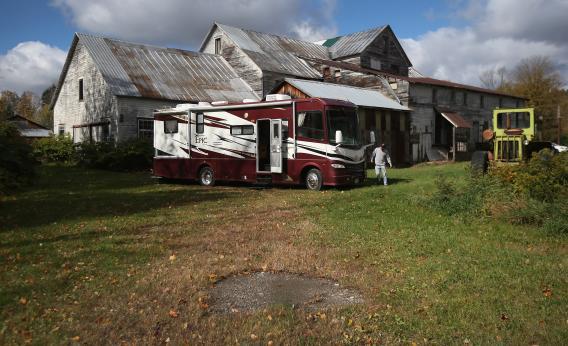Someone recently started an Economist Hulk joke twitter account and rapidly found himself breaking character and discussing an issue in housing policy that’s near and near to my heart: The relationship between the self-interest of incumbent homeowners and NIMBY development restrictions that make house prices high.
The quick take on this is that if you already own a home you want homes to be expensive, so you benefit from supply restrictions. I think that this is mistaken. Housing supply constraints in Jurisdiction X can benefit incument homeowners, but in almost all cases the beneficiaries will own homes located outside of Jurisdiction X.
To make the argument go through, lets imagine a somewhat implausible scenario in which everyone lives in mobile homes. What’s more, nobody rents a mobile home but some people rent a plot of land. Other people own the plot that their home is parked on. Some people might even own one plot of land that they rent out, and park their mobile home on a different plot of land that they pay rent on. There is also zoning in this world. Some locales feature low-density snob zoning that requires large plots of land that host only a single mobile home. Other locales allow for dense packing of mobile homes.
I think two things about this world are pretty clear. One is that your mobile home is never going to appreciate in value. It’s like a car. Durable (you hope) but constantly depreciating. It’s the land that’s the speculative commodity here—the price might go up or it might go down. The other is that upzoning a parcel of land that you own is going to make the land more valuable. Even if the amount of rent-per-trailer you can charge falls as a result of decreased scarcity, the number of trailers that can park on your land will rise and that will more than compensate you. The losers in the arrangement—if any—are going to be the owners of parcels outside the upzoned area who lose customers.
Now obviously that’s not a great description of how the world works. But I do think that it works as a model. Real life with real houses and condo agreements and such is a lot more complicated than that, and there are many more frictions involved. Nevertheless, the core points hold—the structures are depreciating assets, it’s the land that appreciates, and the land that you own will appreciate faster if it’s upzoned. So why do we have NIMBYs anyway? One reason is that people care about things other than money. People wouldn’t live in nice houses in the first place if they didn’t care about things other than money! The people who’ve chosen to live in a given neighborhood are self-selected to like it the way it is, and thus are biased against change for non-pecuniary reasons. From a purely financial perspective you can just relocate, but in real life that’s much more annoying than just driving your mobile home across town. But a second reason is that people genuinely misunderstand this. In rural areas, people do talk about buying and selling land and buying and selling structures as separate issues. But in urban and suburban areas, people generally just talk about “house prices” or “housing costs” and lump it all together. But if you take a block of expensive rowhouses and upzone it for 10-floor condos then the value of the rowhouses should go up even if the price of dwellings falls.
